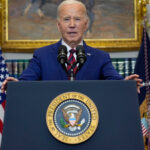
Published October 13, 2022
The new gay rom-com, Bros, has bombed at the box office. Director Nicholas Stoller and star Billy Eichner, in full Nietzschean ressentiment mode, are in little doubt about why the film flopped: homophobic weirdos refusing to go and see it. The indignation reveals much about our immediate cultural moment. It is typical of political discourse today: Each side ascribes its failure to find popular support to the general population’s ignorance or depravity (or both). That conveniently precludes the need for any soul-searching while reinforcing a sense of moral and intellectual superiority. Hillary Clinton offered a master class in this approach after the 2016 presidential election, and the play is now well established across the political divide.
In the case of movies, one might respond to Stoller and Eichner by saying that entertainers are supposed to provide products that the viewing public wishes to see. It might surprise the team behind the didactic Bros that many of us watch movies to be entertained, not to be preached at, seeing them as brief, trivial moments of escape from the drudge of daily life, not an opportunity to (as the Victorians would have said) “improve” ourselves. But even though it has proved an abject commercial failure, the movie is nonetheless instructive in how our culture is changing. And both its production values and its failure are likely signs not of the LGBTQ movement’s influence stalling, but of its remarkable success.
First, there is the fact that the entire cast of the film identifies as LGBTQ. “Faking it” was once the very essence of acting. It did not matter that Laurence Olivier was not a North African when he played the lead in Othello. Nor was it of concern that Leonard Nimoy, despite not being the offspring of a Vulcan father and human mother, nevertheless played Mr. Spock in the original iteration of Star Trek. Acting was acting, a game of pretend and make-believe. Demands that casting reflect real life—or at least real life as the tastes of identity politics require on any given day—reveals just how obsessed with faculty lounge politics the captains of our culture industry have become. That acting is no longer about “faking it” is patently absurd, a basic contradiction in terms, and yet it is applauded unconditionally by the very people involved in the acting industry. To them it not merely makes sense but is positively virtuous. That indicates how the new politics of identity has colonized minds.
The second issue, of course, concerns the possibility of a romantic comedy in today’s climate. Setting aside the fact that Bros is a gay entry in the genre, the question of whether romantic comedies can be commercially successful today is one worth asking. The promiscuous lifestyles that the sexual revolution has promoted, particularly as manifested among gay men, surely militate against romance. Indeed, the very idea of sex as a lifestyle, rather than as a seal on a unique relationship, the establishment of which has taken time, effort, and self-sacrifice, seems to preclude any notion of romance.
Romance depends upon sex being costly. It was the difficulty of obtaining sex, the need for that delicate, complicated, and unpredictable interpersonal dance between two people, that was the very essence of what it was to be romantic. In a world where sex is not simply casual but remarkably cheap, the notion of romance is dead. Romance requires a particular kind of culture in order to make sense. A world of hookups, one-night stands, and all-pervasive pornography is not one that gives people the cultural grammar and syntax to understand it. That the movie apparently contains scenes of sex and nudity is hardly exceptional today. But that’s the point: A world where sex and nudity are displayed on the screen is not a world where romance has any place. Just as explicit rap lyrics reflect a world antithetical to that in which Frank Sinatra sang “Fly me to the moon,” so the endless tedium of explicit sex on celluloid is not that of Audrey Hepburn and Fred Astaire in Funny Face. Romance depends upon social codes of restraint and modesty, and upon the idea that sex is not something casual but something special, even sacred.
The same point can be made with reference to what we might call romantic tragedy. Take Tolstoy’s Anna Karenina. The story simply could not be set in modern America because Anna, married to the tedious Karenin but falling in love with the dashing Vronsky, would simply file for divorce and move out of Karenin’s house and into that of her lover. The tragic romance is rooted in the impossibility of Anna’s situation, given the way sex is seen through the powerful moral lens of nineteenth-century Russian society. The genre of romantic tragedy depends upon a specific moral framework. So does the genre of romantic comedy. But the sexual revolution has obliterated that moral framework.
To return to Bros, it is frankly as ridiculous to make a rom-com in the twenty-first century as it is to hire a cast and crew on the basis of modern categories of identity rather than professional competence. And, while the Bros team might regard its box office failure as discouraging, it might just as easily be evidence of the triumph of the LGBTQ movement in wider society as it is of a residual resistance to the same. Please don’t blame homophobia for your commercial failure. Romance is dead. And you helped to kill it.
Carl R. Trueman is a fellow in EPPC’s Evangelicals in Civic Life Program, where his work focuses on helping civic leaders and policy makers better understand the deep roots of our current cultural malaise. In addition to his scholarship on the intellectual foundations of expressive individualism and the sexual revolution, Trueman is also interested in the origins, rise, and current use of critical theory by progressives. He serves as a professor at Grove City College.
Photo by Myke Simon on Unsplash
Carl R. Trueman is a fellow in EPPC’s Evangelicals in Civic Life Program, where his work focuses on helping civic leaders and policy makers better understand the deep roots of our current cultural malaise. In addition to his scholarship on the intellectual foundations of expressive individualism and the sexual revolution, Trueman is also interested in the origins, rise, and current use of critical theory by progressives. He serves as a professor at Grove City College.








